Dosing & Uses
Dosage Forms & Strengths
injectable solution
- 10mg/mL (2mL, 8mL, 16mL vials)
- 20mg/mL (1mL, 4mL vials)
alcohol-free solution for injection
- 20mg/mL
- 80mg/4mL
- 160mg/8mL
Breast Cancer
Locally advanced or metastatic
- For locally advanced or metastatic breast cancer after failure of prior chemotherapy
- Monotherapy: 60-100 mg/m² IV over 1 hr q3Weeks
Operable node-positive
- Adjuvant combination therapy: 75 mg/m² IV 1 hr after doxorubicin and cyclophosphamide q3Weeks x 6 cycles
Dosage modifications (advanced or metastatic)
- Inital 100 mg/m²
- Febrile neutropenia, ANC <500/mm³ for ≥1 week, or severe/cumulative cutaneous reactions
- Reduce first to 75 mg/m²
- If AEs persist: Reduce further to 55 mg/m² or discontinue
Dosage modifications (adjuvant treatment)
- Initial: 75 mg/m²
- Reduce to 60 mg/m² in patients with febrile neutropenia treated with G-CSF, or severe or cumulative cutaneous or neurosensory reactions
Other dosage modifications
- Grade 3 peripheral neuropathy: Discontinue
- Combo therapy (with doxorubicin and cyclophosphamide): Febrile neutropenia (give G-CSF in all, if continues, reduce to 60 mg/m², continue G-CSF)
- Grade 3/4 Stomatitis: Decrease to 60 mg/m²
- Severe/cumulative cutaneous reactions, moderate neurosensory S/S: Reduce to 60 mg/m²
- Discontinue if adverse effects persists
Non-small Cell Lung Cancer
Indicated for treatment (as monotherapy) in patients with locally advanced or metastatic NSCLC after failure of prior platinum-based chemotherapy
Also indicated in combination with cisplatin for the treatment of unresectable, locally advanced or metastatic NSCLC in patients who have not previously received chemotherapy
Dose Modifications (Monotherapy)
- Febrile neutropenia, ANC <500/mm3 for ≥1 week, other grade 3/4 nonhematological toxicities, severe/cumulative cutaneous reactions (withhold treatment until resolution; THEN, resume at 55 mg/m2)
- Grade 3 peripheral neuropathy: Discontinue
Dose Modifications (Combination Therapy)
- Febrile neutropenia,platelet nadir <25,000 cells/mm3 serious non-hematologic toxicities: Reduce first to 65 mg/m2; may reduce further to 50 mg/m²
Gastric Cancer
Indicated in combination with cisplatin and fluorouracil advanced gastric adenocarcinoma, including adenocarcinoma of the gastroesophageal junction, in patients who have not received prior chemotherapy for advanced disease
Day 1: 75 mg/m2 IV infusion over 1 hour, followed by cisplatin 75 mg/m2 as a 1-3 hr infusion
Post cisplatin: Fluorouracil 750 mg/m2 qDay given as a 24-hr continuous infusion for 5 days
Repeat cycle q3Weeks
Dose modifications (neutropenia)
- Febrile neutropenia, prolonged neutropenia or neutropenic infection
- First time: Use G-CSF
- If continues despite G-CSF: Reduce to 60 mg/m2
- If recurs thereafter: Reduce to 45 mg/m2
Grade 4 thrombocytopenia
- Do not resume until ANC >1500/mm3 and platelets >100,000/mm3
- Reduce to 60 mg/m2
- If toxicities persist: Discontinue
Diarrhea
- Grade 3 (first episode): Reduce fluorouracil dose by 20%
- Grade 3 (second episode): Then reduce docetaxel dose by 20%
- Grade 4 (first episode): Reduce docetaxel & fluorouracil doses by 20%
- Grade 4 (second episode): Discontinue treatment
Hepatotoxicity
- AST/ALT 2.5-5 times ULN & alkaline phosphatase 2.5 times ULN, OR AST/ALT 1.5-5 times ULN & alkaline phosphatase 2.5-5 times ULN: Reduce by 20%
- If AST/ALT >5 times upper limit of normal &/or alkaline phosphatase >5 times ULN: Discontinue
Head & Neck Cancer
Indicated in combination with cisplatin and fluorouracil for the induction treatment of patients with locally advanced squamous cell carcinoma of the head and neck (SCCHN)
Induction chemotherapy followed by radiotherapy
- For the induction treatment of locally advanced inoperable SCCHN
- Day 1: 75 mg/m2 IV infusion over 1 hour, followed by cisplatin 75 mg/m2 as a 1 hr infusion
- Post cisplatin: Fluorouracil 750 mg/m2 qDay given as a 24-hr continuous IV infusion times 5 days
- Repeat cycle q3Weeks 4 times
Induction chemotherapy followed by chemoradiotherapy
- For the induction treatment of patients with locally advanced (unresectable, low surgical cure, or organ preservation) SCCHN
- Day 1: 75 mg/m2 IV infusion over 1 hr, followed by cisplatin 100 mg/m2 as a 0.5-3 hr IV infusion
- Post cisplatin: Fluorouracil 1000 mg/m2 qDay given as a 24-hr continuous IV infusion from day 1 to day 4
- Repeat cycle q3Weeks times 3 cycles
Dosage Modifications
- As with gastric cancer
Prostate Cancer
Indicated for hormone-refractory metastatic prostate cancer in combination with prednisone
75 mg/m2 IV over 1 hr q3Weeks with daily prednisone 5 mg PO q12hr
Dose Modifications
- Febrile neutropenia, ANC <500/mm3 for >1 week, or severe/cumulative cutaneous reactions, moderate neurosensory S/S
- Reduce to 60 mg/m2
- If AEs persist: Discontinue
Renal Impairment
Dose adjustment not necessary
Hepatic Impairment
Do not administer if AST/ALT >5x ULN or alkaline phosphatase (AP) >5x ULN
Avoid in patients with bilirubin >ULN and patients with AST and/or ALT >1.5 × ULN concomitant with alkaline phosphatase >2.5 × ULN
Reduce dose by 20% if AST/ALT >2.5-5x ULN and AP ≤2.5x ULN
Reduce dose by 20% if AST/ALT >1.5-5x ULN and AP >2.5-5x ULN
Consider alcohol content of docetaxel when given to patients with hepatic impairment
Safety and efficacy not established
Investigational use for a variety of solid tumors in children is ongoing
Docetaxel has been studied in a total of 289 pediatric patients: 239 in 2 trials with monotherapy and 50 in combination treatment with cisplatin and 5-fluorouracil (see Prescribing Information)
Interactions
Interaction Checker
No Results

Contraindicated
Serious - Use Alternative
Significant - Monitor Closely
Minor

Contraindicated (0)
Serious - Use Alternative (24)
- adenovirus types 4 and 7 live, oral
docetaxel decreases effects of adenovirus types 4 and 7 live, oral by pharmacodynamic antagonism. Avoid or Use Alternate Drug. Immunosuppressives may diminish therapeutic effects of vaccines and increase risk of adverse effects (increased risk of infection). Live-attenuated vaccines should be avoided for at least 3mo after cessation of immunosuppressive therapy.
- apalutamide
apalutamide will decrease the level or effect of docetaxel by affecting hepatic/intestinal enzyme CYP3A4 metabolism. Avoid or Use Alternate Drug. Coadministration of apalutamide, a strong CYP3A4 inducer, with drugs that are CYP3A4 substrates can result in lower exposure to these medications. Avoid or substitute another drug for these medications when possible. Evaluate for loss of therapeutic effect if medication must be coadministered. Adjust dose according to prescribing information if needed.
- ceritinib
ceritinib will increase the level or effect of docetaxel by affecting hepatic/intestinal enzyme CYP3A4 metabolism. Avoid or Use Alternate Drug.
- chloramphenicol
chloramphenicol will increase the level or effect of docetaxel by affecting hepatic/intestinal enzyme CYP3A4 metabolism. Avoid or Use Alternate Drug.
- deferiprone
deferiprone, docetaxel. Either increases toxicity of the other by pharmacodynamic synergism. Avoid or Use Alternate Drug. Avoid use of deferiprone with other drugs known to be associated with neutropenia or agranulocytosis; if an alternative is not possible, monitor absolute neutrophil count more frequently.
- enzalutamide
enzalutamide will decrease the level or effect of docetaxel by affecting hepatic/intestinal enzyme CYP3A4 metabolism. Avoid or Use Alternate Drug.
- erdafitinib
erdafitinib will increase the level or effect of docetaxel by P-glycoprotein (MDR1) efflux transporter. Avoid or Use Alternate Drug. If coadministration unavoidable, separate administration by at least 6 hr before or after administration of P-gp substrates with narrow therapeutic index.
- etrasimod
etrasimod, docetaxel. Either increases effects of the other by immunosuppressive effects; risk of infection. Avoid or Use Alternate Drug. Risk of additive immune system effects with etrasimod has not been studied in combination with antineoplastic, immune-modulating, or noncorticosteroid immunosuppressive therapies. Avoid coadministration during and in the weeks following administration of etrasimod. .
- fexinidazole
fexinidazole will increase the level or effect of docetaxel by affecting hepatic/intestinal enzyme CYP3A4 metabolism. Avoid or Use Alternate Drug. Fexinidazole inhibits CYP3A4. Coadministration may increase risk for adverse effects of CYP3A4 substrates.
- idelalisib
idelalisib will increase the level or effect of docetaxel by affecting hepatic/intestinal enzyme CYP3A4 metabolism. Avoid or Use Alternate Drug. Idelalisib is a strong CYP3A inhibitor; avoid coadministration with sensitive CYP3A substrates
- influenza virus vaccine quadrivalent, adjuvanted
docetaxel decreases effects of influenza virus vaccine quadrivalent, adjuvanted by pharmacodynamic antagonism. Avoid or Use Alternate Drug. Immunosuppressive drugs may reduce the immune response to influenza vaccine.
- influenza virus vaccine trivalent, adjuvanted
docetaxel decreases effects of influenza virus vaccine trivalent, adjuvanted by pharmacodynamic antagonism. Avoid or Use Alternate Drug. Immunosuppressive drugs may reduce the immune response to influenza vaccine.
- itraconazole
itraconazole will increase the level or effect of docetaxel by affecting hepatic/intestinal enzyme CYP3A4 metabolism. Avoid or Use Alternate Drug. If coadministration is unavoidable, consider a 50% docetaxel dose reduction and monitor for increased docetaxel toxicities.
- lasmiditan
lasmiditan increases levels of docetaxel by P-glycoprotein (MDR1) efflux transporter. Avoid or Use Alternate Drug.
- lonafarnib
docetaxel will increase the level or effect of lonafarnib by affecting hepatic/intestinal enzyme CYP3A4 metabolism. Avoid or Use Alternate Drug. If coadministration of lonafarnib (a sensitive CYP3A substrate) with weak CYP3A inhibitors is unavoidable, reduce to, or continue lonafarnib at starting dose. Closely monitor for arrhythmias and events (eg, syncope, heart palpitations) since lonafarnib effect on QT interval is unknown.
- nefazodone
nefazodone will increase the level or effect of docetaxel by affecting hepatic/intestinal enzyme CYP3A4 metabolism. Avoid or Use Alternate Drug.
- palifermin
palifermin increases toxicity of docetaxel by Other (see comment). Avoid or Use Alternate Drug. Comment: Palifermin should not be administered within 24 hrbefore, during infusion of, or within 24 hr after administration of antineoplastic agents. Coadministration of palifermin within 24 hr of chemotherapy resulted in increased severity and duration of oral mucositis.
- quinidine
quinidine will increase the level or effect of docetaxel by P-glycoprotein (MDR1) efflux transporter. Avoid or Use Alternate Drug.
- ropeginterferon alfa 2b
ropeginterferon alfa 2b, docetaxel. Either increases levels of the other by Other (see comment). Avoid or Use Alternate Drug. Comment: Myelosuppressive agents can produce additive myelosuppression. Avoid use and monitor patients receiving the combination for effects of excessive myelosuppression.
- selinexor
selinexor, docetaxel. unspecified interaction mechanism. Avoid or Use Alternate Drug. Patients treated with selinexor may experience neurological toxicities. Avoid taking selinexor with other medications that may cause dizziness or confusion.
- sotorasib
sotorasib will decrease the level or effect of docetaxel by P-glycoprotein (MDR1) efflux transporter. Avoid or Use Alternate Drug. If use is unavoidable, refer to the prescribing information of the P-gp substrate for dosage modifications.
- tepotinib
tepotinib will increase the level or effect of docetaxel by P-glycoprotein (MDR1) efflux transporter. Avoid or Use Alternate Drug. If concomitant use unavoidable, reduce the P-gp substrate dosage if recommended in its approved product labeling.
- tucatinib
tucatinib will increase the level or effect of docetaxel by affecting hepatic/intestinal enzyme CYP3A4 metabolism. Avoid or Use Alternate Drug. Avoid concomitant use of tucatinib with CYP3A substrates, where minimal concentration changes may lead to serious or life-threatening toxicities. If unavoidable, reduce CYP3A substrate dose according to product labeling.
- voxelotor
voxelotor will increase the level or effect of docetaxel by affecting hepatic/intestinal enzyme CYP3A4 metabolism. Avoid or Use Alternate Drug. Voxelotor increases systemic exposure of sensitive CYP3A4 substrates. Avoid coadministration with sensitive CYP3A4 substrates with a narrow therapeutic index. Consider dose reduction of the sensitive CYP3A4 substrate(s) if unable to avoid.
Monitor Closely (104)
- acalabrutinib
acalabrutinib, docetaxel. Either increases toxicity of the other by pharmacodynamic synergism. Use Caution/Monitor. Coadministration may increase risk of myelosuppressive effects.
- amiodarone
amiodarone will increase the level or effect of docetaxel by P-glycoprotein (MDR1) efflux transporter. Use Caution/Monitor.
- atogepant
docetaxel will increase the level or effect of atogepant by affecting hepatic/intestinal enzyme CYP3A4 metabolism. Use Caution/Monitor.
- atorvastatin
atorvastatin will increase the level or effect of docetaxel by P-glycoprotein (MDR1) efflux transporter. Use Caution/Monitor.
- avapritinib
docetaxel will increase the level or effect of avapritinib by affecting hepatic/intestinal enzyme CYP3A4 metabolism. Use Caution/Monitor.
- axitinib
docetaxel increases levels of axitinib by affecting hepatic/intestinal enzyme CYP3A4 metabolism. Use Caution/Monitor.
- belatacept
belatacept and docetaxel both increase immunosuppressive effects; risk of infection. Use Caution/Monitor.
- belzutifan
belzutifan will decrease the level or effect of docetaxel by affecting hepatic/intestinal enzyme CYP3A4 metabolism. Modify Therapy/Monitor Closely. If unable to avoid coadministration of belzutifan with sensitive CYP3A4 substrates, consider increasing the sensitive CYP3A4 substrate dose in accordance with its prescribing information.
- berotralstat
berotralstat will increase the level or effect of docetaxel by P-glycoprotein (MDR1) efflux transporter. Use Caution/Monitor. Monitor or titrate P-gp substrate dose if coadministered.
- bosutinib
bosutinib increases levels of docetaxel by P-glycoprotein (MDR1) efflux transporter. Use Caution/Monitor.
- carbamazepine
carbamazepine will decrease the level or effect of docetaxel by affecting hepatic/intestinal enzyme CYP3A4 metabolism. Use Caution/Monitor.
- cenobamate
cenobamate will decrease the level or effect of docetaxel by affecting hepatic/intestinal enzyme CYP3A4 metabolism. Modify Therapy/Monitor Closely. Increase dose of CYP3A4 substrate, as needed, when coadministered with cenobamate.
- cholera vaccine
docetaxel decreases effects of cholera vaccine by immunosuppressive effects; risk of infection. Modify Therapy/Monitor Closely. Immunosuppressive therapies, including irradiation, antimetabolites, alkylating agents, cytotoxic drugs and corticosteroids (used in greater than physiologic doses), may reduce the immune response to cholera vaccine.
- cimetidine
cimetidine will increase the level or effect of docetaxel by affecting hepatic/intestinal enzyme CYP3A4 metabolism. Use Caution/Monitor.
- clarithromycin
clarithromycin will increase the level or effect of docetaxel by affecting hepatic/intestinal enzyme CYP3A4 metabolism. Use Caution/Monitor.
clarithromycin will increase the level or effect of docetaxel by P-glycoprotein (MDR1) efflux transporter. Use Caution/Monitor. - clotrimazole
clotrimazole will increase the level or effect of docetaxel by P-glycoprotein (MDR1) efflux transporter. Use Caution/Monitor.
- cobicistat
cobicistat will increase the level or effect of docetaxel by affecting hepatic/intestinal enzyme CYP3A4 metabolism. Modify Therapy/Monitor Closely. May consider reducing docetaxel dosing 50% if concomitant administration cannot be avoided
- crizotinib
crizotinib increases levels of docetaxel by affecting hepatic/intestinal enzyme CYP3A4 metabolism. Use Caution/Monitor. Dose reduction may be needed for coadministered drugs that are predominantly metabolized by CYP3A.
crizotinib increases levels of docetaxel by P-glycoprotein (MDR1) efflux transporter. Use Caution/Monitor. - cyclosporine
cyclosporine will increase the level or effect of docetaxel by P-glycoprotein (MDR1) efflux transporter. Use Caution/Monitor.
- dabrafenib
dabrafenib will decrease the level or effect of docetaxel by affecting hepatic/intestinal enzyme CYP3A4 metabolism. Modify Therapy/Monitor Closely.
- danicopan
danicopan will increase the level or effect of docetaxel by P-glycoprotein (MDR1) efflux transporter. Use Caution/Monitor. Danicopan increases plasma concentrations of P-gp substrates; consider dose reduction of P-gp substrates where minimal concentration changes may lead to serious adverse reactions.
- dengue vaccine
docetaxel, dengue vaccine. immunosuppressive effects; risk of infection. Use Caution/Monitor. Immunosuppressive therapies (eg, irradiation, antimetabolites, alkylating agents, cytotoxic drugs, corticosteroids [greater than physiologic doses]) may reduce immune response to dengue vaccine.
- denosumab
docetaxel, denosumab. Other (see comment). Use Caution/Monitor. Comment: Caution should be taken in patients on concomitant immunosuppressants or with impaired immune systems because of increased risk for serious infections.
- diltiazem
diltiazem will increase the level or effect of docetaxel by affecting hepatic/intestinal enzyme CYP3A4 metabolism. Use Caution/Monitor.
- dronedarone
dronedarone will increase the level or effect of docetaxel by P-glycoprotein (MDR1) efflux transporter. Use Caution/Monitor.
- duvelisib
duvelisib will increase the level or effect of docetaxel by affecting hepatic/intestinal enzyme CYP3A4 metabolism. Modify Therapy/Monitor Closely. Coadministration with duvelisib increases AUC of a sensitive CYP3A4 substrate which may increase the risk of toxicities of these drugs. Consider reducing the dose of the sensitive CYP3A4 substrate and monitor for signs of toxicities of the coadministered sensitive CYP3A substrate.
- efavirenz
efavirenz will decrease the level or effect of docetaxel by affecting hepatic/intestinal enzyme CYP3A4 metabolism. Use Caution/Monitor.
- elagolix
elagolix will decrease the level or effect of docetaxel by affecting hepatic/intestinal enzyme CYP3A4 metabolism. Modify Therapy/Monitor Closely. Elagolix is a weak-to-moderate CYP3A4 inducer. Monitor CYP3A substrates if coadministered. Consider increasing CYP3A substrate dose if needed.
- eliglustat
eliglustat increases levels of docetaxel by P-glycoprotein (MDR1) efflux transporter. Modify Therapy/Monitor Closely. Monitor therapeutic drug concentrations, as indicated, or consider reducing the dosage of the P-gp substrate and titrate to clinical effect.
- elvitegravir/cobicistat/emtricitabine/tenofovir DF
elvitegravir/cobicistat/emtricitabine/tenofovir DF increases levels of docetaxel by affecting hepatic/intestinal enzyme CYP3A4 metabolism. Modify Therapy/Monitor Closely. Cobicistat is a CYP3A4 inhibitor; contraindicated with CYP3A4 substrates for which elevated plasma concentrations are associated with serious and/or life-threatening events.
- encorafenib
encorafenib, docetaxel. affecting hepatic/intestinal enzyme CYP3A4 metabolism. Use Caution/Monitor. Encorafenib both inhibits and induces CYP3A4 at clinically relevant plasma concentrations. Coadministration of encorafenib with sensitive CYP3A4 substrates may result in increased toxicity or decreased efficacy of these agents.
- erythromycin base
erythromycin base will increase the level or effect of docetaxel by affecting hepatic/intestinal enzyme CYP3A4 metabolism. Use Caution/Monitor.
erythromycin base will increase the level or effect of docetaxel by P-glycoprotein (MDR1) efflux transporter. Use Caution/Monitor. - erythromycin ethylsuccinate
erythromycin ethylsuccinate will increase the level or effect of docetaxel by affecting hepatic/intestinal enzyme CYP3A4 metabolism. Use Caution/Monitor.
erythromycin ethylsuccinate will increase the level or effect of docetaxel by P-glycoprotein (MDR1) efflux transporter. Use Caution/Monitor. - erythromycin lactobionate
erythromycin lactobionate will increase the level or effect of docetaxel by affecting hepatic/intestinal enzyme CYP3A4 metabolism. Use Caution/Monitor.
erythromycin lactobionate will increase the level or effect of docetaxel by P-glycoprotein (MDR1) efflux transporter. Use Caution/Monitor. - erythromycin stearate
erythromycin stearate will increase the level or effect of docetaxel by affecting hepatic/intestinal enzyme CYP3A4 metabolism. Use Caution/Monitor.
erythromycin stearate will increase the level or effect of docetaxel by P-glycoprotein (MDR1) efflux transporter. Use Caution/Monitor. - ethotoin
docetaxel decreases levels of ethotoin by inhibition of GI absorption. Applies only to oral form of both agents. Use Caution/Monitor.
docetaxel decreases levels of ethotoin by increasing metabolism. Use Caution/Monitor. - fedratinib
fedratinib will increase the level or effect of docetaxel by affecting hepatic/intestinal enzyme CYP3A4 metabolism. Use Caution/Monitor. Adjust dose of drugs that are CYP3A4 substrates as necessary.
- felodipine
felodipine will increase the level or effect of docetaxel by P-glycoprotein (MDR1) efflux transporter. Use Caution/Monitor.
- finerenone
docetaxel will increase the level or effect of finerenone by affecting hepatic/intestinal enzyme CYP3A4 metabolism. Modify Therapy/Monitor Closely. Monitor serum potassium during initiation and dosage adjustment of either finererone or weak CYP3A4 inhibitors. Adjust finererone dosage as needed.
- fingolimod
docetaxel increases effects of fingolimod by immunosuppressive effects; risk of infection. Modify Therapy/Monitor Closely. Concomitant therapy is expected to increase the risk of immunosuppression. Use caution when switching patients from long-acting therapies with immune effects. .
- flibanserin
docetaxel will increase the level or effect of flibanserin by affecting hepatic/intestinal enzyme CYP3A4 metabolism. Use Caution/Monitor. Increased flibanserin adverse effects may occur if coadministered with multiple weak CYP3A4 inhibitors.
- fosphenytoin
fosphenytoin will decrease the level or effect of docetaxel by P-glycoprotein (MDR1) efflux transporter. Use Caution/Monitor.
docetaxel decreases levels of fosphenytoin by inhibition of GI absorption. Applies only to oral form of both agents. Use Caution/Monitor.
docetaxel decreases levels of fosphenytoin by increasing metabolism. Use Caution/Monitor. - fostamatinib
fostamatinib will increase the level or effect of docetaxel by P-glycoprotein (MDR1) efflux transporter. Use Caution/Monitor. Concomitant use of fostamatinib may increase concentrations of P-gp substrates. Monitor for toxicities of the P-gp substrate drug that may require dosage reduction when given concurrently with fostamatinib.
- glecaprevir/pibrentasvir
glecaprevir/pibrentasvir will increase the level or effect of docetaxel by P-glycoprotein (MDR1) efflux transporter. Use Caution/Monitor.
- hydroxyurea
docetaxel, hydroxyurea. Other (see comment). Use Caution/Monitor. Comment: Combination may increase risk of myelosuppression.
- iloperidone
iloperidone increases levels of docetaxel by affecting hepatic/intestinal enzyme CYP3A4 metabolism. Use Caution/Monitor. Iloperidone is a time-dependent CYP3A inhibitor and may lead to increased plasma levels of drugs predominantly eliminated by CYP3A4.
- isavuconazonium sulfate
docetaxel will increase the level or effect of isavuconazonium sulfate by affecting hepatic/intestinal enzyme CYP3A4 metabolism. Use Caution/Monitor.
- isoniazid
isoniazid will increase the level or effect of docetaxel by affecting hepatic/intestinal enzyme CYP3A4 metabolism. Modify Therapy/Monitor Closely.
- istradefylline
istradefylline will increase the level or effect of docetaxel by affecting hepatic/intestinal enzyme CYP3A4 metabolism. Use Caution/Monitor. Istradefylline 40 mg/day increased peak levels and AUC of CYP3A4 substrates in clinical trials. This effect was not observed with istradefylline 20 mg/day. Consider dose reduction of sensitive CYP3A4 substrates.
istradefylline will increase the level or effect of docetaxel by P-glycoprotein (MDR1) efflux transporter. Use Caution/Monitor. Istradefylline 40 mg/day increased peak levels and AUC of P-gp substrates in clinical trials. Consider dose reduction of sensitive P-gp substrates. - ivacaftor
ivacaftor increases levels of docetaxel by P-glycoprotein (MDR1) efflux transporter. Use Caution/Monitor. Ivacaftor and its M1 metabolite has the potential to inhibit P-gp; may significantly increase systemic exposure to sensitive P-gp substrates with a narrow therapeutic index.
- ivosidenib
ivosidenib will decrease the level or effect of docetaxel by affecting hepatic/intestinal enzyme CYP3A4 metabolism. Use Caution/Monitor.
- ketoconazole
ketoconazole will increase the level or effect of docetaxel by affecting hepatic/intestinal enzyme CYP3A4 metabolism. Use Caution/Monitor.
ketoconazole will increase the level or effect of docetaxel by P-glycoprotein (MDR1) efflux transporter. Use Caution/Monitor. - lapatinib
lapatinib will increase the level or effect of docetaxel by P-glycoprotein (MDR1) efflux transporter. Use Caution/Monitor.
- lemborexant
docetaxel will increase the level or effect of lemborexant by affecting hepatic/intestinal enzyme CYP3A4 metabolism. Modify Therapy/Monitor Closely. Lower nightly dose of lemborexant recommended if coadministered with weak CYP3A4 inhibitors. See drug monograph for specific dosage modification.
- lenacapavir
lenacapavir will increase the level or effect of docetaxel by affecting hepatic/intestinal enzyme CYP3A4 metabolism. Use Caution/Monitor. Lencapavir (a moderate CYP3A4 inhibitor) may increase CYP3A4 substrates initiated within 9 months after last SC dose of lenacapavir, which may increase potential risk of adverse reactions of CYP3A4 substrates.
- letermovir
letermovir increases levels of docetaxel by affecting hepatic/intestinal enzyme CYP3A4 metabolism. Use Caution/Monitor.
- levoketoconazole
levoketoconazole will increase the level or effect of docetaxel by affecting hepatic/intestinal enzyme CYP3A4 metabolism. Use Caution/Monitor.
levoketoconazole will increase the level or effect of docetaxel by P-glycoprotein (MDR1) efflux transporter. Use Caution/Monitor. - lomitapide
docetaxel increases levels of lomitapide by affecting hepatic/intestinal enzyme CYP3A4 metabolism. Use Caution/Monitor. Lomitapide dose should not exceed 30 mg/day.
lomitapide increases levels of docetaxel by P-glycoprotein (MDR1) efflux transporter. Modify Therapy/Monitor Closely. Consider reducing dose when used concomitantly with lomitapide. - lonafarnib
lonafarnib will increase the level or effect of docetaxel by P-glycoprotein (MDR1) efflux transporter. Modify Therapy/Monitor Closely. Lonafarnib is a weak P-gp inhibitor. Monitor for adverse reactions if coadministered with P-gp substrates where minimal concentration changes may lead to serious or life-threatening toxicities. Reduce P-gp substrate dose if needed.
- lopinavir
lopinavir will increase the level or effect of docetaxel by affecting hepatic/intestinal enzyme CYP3A4 metabolism. Use Caution/Monitor.
- loratadine
loratadine will increase the level or effect of docetaxel by P-glycoprotein (MDR1) efflux transporter. Use Caution/Monitor.
- lorlatinib
lorlatinib will decrease the level or effect of docetaxel by affecting hepatic/intestinal enzyme CYP3A4 metabolism. Use Caution/Monitor.
- lovastatin
lovastatin will increase the level or effect of docetaxel by P-glycoprotein (MDR1) efflux transporter. Use Caution/Monitor.
- meningococcal group B vaccine
docetaxel decreases effects of meningococcal group B vaccine by pharmacodynamic antagonism. Use Caution/Monitor. Individuals with altered immunocompetence may have reduced immune responses to the vaccine.
- midazolam intranasal
docetaxel will increase the level or effect of midazolam intranasal by affecting hepatic/intestinal enzyme CYP3A4 metabolism. Use Caution/Monitor. Coadministration of mild CYP3A4 inhibitors with midazolam intranasal may cause higher midazolam systemic exposure, which may prolong sedation.
- mifepristone
mifepristone will increase the level or effect of docetaxel by affecting hepatic/intestinal enzyme CYP3A4 metabolism. Modify Therapy/Monitor Closely. Closely monitor for docetaxel-related adverse reactions and consider 50% dose reduction of docetaxel if concomitant use of docetaxel with chronic mifepristone necessary; clinical significance of this interaction with short-term use of mifepristone for termination of pregnancy unknown
- mitotane
mitotane decreases levels of docetaxel by affecting hepatic/intestinal enzyme CYP3A4 metabolism. Use Caution/Monitor. Mitotane is a strong inducer of cytochrome P-4503A4; monitor when coadministered with CYP3A4 substrates for possible dosage adjustments.
- nefazodone
nefazodone will increase the level or effect of docetaxel by P-glycoprotein (MDR1) efflux transporter. Use Caution/Monitor.
- nicardipine
nicardipine will increase the level or effect of docetaxel by P-glycoprotein (MDR1) efflux transporter. Use Caution/Monitor.
- nifedipine
nifedipine will decrease the level or effect of docetaxel by P-glycoprotein (MDR1) efflux transporter. Use Caution/Monitor.
- nilotinib
nilotinib will increase the level or effect of docetaxel by P-glycoprotein (MDR1) efflux transporter. Use Caution/Monitor.
- ofatumumab SC
ofatumumab SC, docetaxel. Either increases effects of the other by immunosuppressive effects; risk of infection. Use Caution/Monitor. Consider the risk of additive immune system effects when coadministering immunosuppressive therapies with coadministration. When switching from therapies with immune effects, take into account the duration and mechanism of action of these therapies when initiating ofatumumab SC.
- olaparib
docetaxel and olaparib both increase pharmacodynamic synergism. Use Caution/Monitor. Coadministration with other other myelosuppressive anticancer agents, including DNA damaging agents, may potentiate and prolongate the myelosuppressive toxicity.
- oxaliplatin
oxaliplatin, docetaxel. Either increases toxicity of the other by pharmacodynamic synergism. Use Caution/Monitor. Coadministration with oxaliplatin may increase the risk of immunosuppression and myelosuppression. Administer taxanes derivative before oxaliplatin when given as sequential infusions to limit toxicity. .
- phenobarbital
phenobarbital will decrease the level or effect of docetaxel by P-glycoprotein (MDR1) efflux transporter. Use Caution/Monitor.
- phenytoin
phenytoin will decrease the level or effect of docetaxel by P-glycoprotein (MDR1) efflux transporter. Use Caution/Monitor.
docetaxel decreases levels of phenytoin by inhibition of GI absorption. Applies only to oral form of both agents. Use Caution/Monitor.
docetaxel decreases levels of phenytoin by increasing metabolism. Use Caution/Monitor. - ponatinib
ponatinib increases levels of docetaxel by P-glycoprotein (MDR1) efflux transporter. Use Caution/Monitor.
- quercetin
quercetin will decrease the level or effect of docetaxel by P-glycoprotein (MDR1) efflux transporter. Use Caution/Monitor.
- ranolazine
ranolazine will increase the level or effect of docetaxel by P-glycoprotein (MDR1) efflux transporter. Use Caution/Monitor.
- ribociclib
ribociclib will increase the level or effect of docetaxel by affecting hepatic/intestinal enzyme CYP3A4 metabolism. Use Caution/Monitor.
- rifabutin
rifabutin will decrease the level or effect of docetaxel by affecting hepatic/intestinal enzyme CYP3A4 metabolism. Use Caution/Monitor.
- rifampin
rifampin will decrease the level or effect of docetaxel by affecting hepatic/intestinal enzyme CYP3A4 metabolism. Use Caution/Monitor.
rifampin will decrease the level or effect of docetaxel by P-glycoprotein (MDR1) efflux transporter. Use Caution/Monitor. - ritonavir
ritonavir will increase the level or effect of docetaxel by P-glycoprotein (MDR1) efflux transporter. Use Caution/Monitor.
- rucaparib
rucaparib will increase the level or effect of docetaxel by affecting hepatic/intestinal enzyme CYP3A4 metabolism. Modify Therapy/Monitor Closely. Adjust dosage of CYP3A4 substrates, if clinically indicated.
- saquinavir
saquinavir increases levels of docetaxel by affecting hepatic/intestinal enzyme CYP3A4 metabolism. Use Caution/Monitor. Potential for increased toxicity. .
- sarecycline
sarecycline will increase the level or effect of docetaxel by P-glycoprotein (MDR1) efflux transporter. Use Caution/Monitor. Monitor for toxicities of P-gp substrates that may require dosage reduction when coadministered with P-gp inhibitors.
- simvastatin
simvastatin will increase the level or effect of docetaxel by P-glycoprotein (MDR1) efflux transporter. Use Caution/Monitor.
- siponimod
siponimod and docetaxel both increase immunosuppressive effects; risk of infection. Use Caution/Monitor. Caution if coadministered because of additive immunosuppressive effects during such therapy and in the weeks following administration. When switching from drugs with prolonged immune effects, consider the half-life and mode of action of these drugs to avoid unintended additive immunosuppressive effects.
- sipuleucel-T
docetaxel decreases effects of sipuleucel-T by pharmacodynamic antagonism. Modify Therapy/Monitor Closely.
- sirolimus
sirolimus will increase the level or effect of docetaxel by P-glycoprotein (MDR1) efflux transporter. Use Caution/Monitor.
- St John's Wort
St John's Wort will decrease the level or effect of docetaxel by affecting hepatic/intestinal enzyme CYP3A4 metabolism. Use Caution/Monitor.
St John's Wort will decrease the level or effect of docetaxel by P-glycoprotein (MDR1) efflux transporter. Use Caution/Monitor. - stiripentol
stiripentol, docetaxel. affecting hepatic/intestinal enzyme CYP3A4 metabolism. Modify Therapy/Monitor Closely. Stiripentol is a CYP3A4 inhibitor and inducer. Monitor CYP3A4 substrates coadministered with stiripentol for increased or decreased effects. CYP3A4 substrates may require dosage adjustment.
stiripentol will increase the level or effect of docetaxel by P-glycoprotein (MDR1) efflux transporter. Modify Therapy/Monitor Closely. Consider reducing the dose of P-glycoprotein (P-gp) substrates, if adverse reactions are experienced when administered concomitantly with stiripentol. - tacrolimus
tacrolimus will increase the level or effect of docetaxel by P-glycoprotein (MDR1) efflux transporter. Use Caution/Monitor.
- tazemetostat
tazemetostat will decrease the level or effect of docetaxel by affecting hepatic/intestinal enzyme CYP3A4 metabolism. Use Caution/Monitor.
docetaxel will increase the level or effect of tazemetostat by affecting hepatic/intestinal enzyme CYP3A4 metabolism. Use Caution/Monitor. - tecovirimat
tecovirimat will decrease the level or effect of docetaxel by affecting hepatic/intestinal enzyme CYP3A4 metabolism. Use Caution/Monitor. Tecovirimat is a weak CYP3A4 inducer. Monitor sensitive CYP3A4 substrates for effectiveness if coadministered.
- tinidazole
docetaxel will increase the level or effect of tinidazole by affecting hepatic/intestinal enzyme CYP3A4 metabolism. Use Caution/Monitor.
- tipranavir
tipranavir increases levels of docetaxel by affecting hepatic/intestinal enzyme CYP3A4 metabolism. Use Caution/Monitor. Potential for increased toxicity. .
- tolvaptan
tolvaptan will increase the level or effect of docetaxel by P-glycoprotein (MDR1) efflux transporter. Use Caution/Monitor.
- trastuzumab
trastuzumab, docetaxel. Either increases toxicity of the other by immunosuppressive effects; risk of infection. Use Caution/Monitor. Neutropenia or febrile neutropenia incidence were increased when trastuzumab was coadministered with myelosuppressive chemotherapy. .
- trastuzumab deruxtecan
trastuzumab deruxtecan, docetaxel. Either increases toxicity of the other by immunosuppressive effects; risk of infection. Use Caution/Monitor. Neutropenia or febrile neutropenia incidence were increased when trastuzumab was coadministered with myelosuppressive chemotherapy. .
- trazodone
trazodone will decrease the level or effect of docetaxel by P-glycoprotein (MDR1) efflux transporter. Use Caution/Monitor.
- tucatinib
tucatinib will increase the level or effect of docetaxel by P-glycoprotein (MDR1) efflux transporter. Use Caution/Monitor. Consider reducing the dosage of P-gp substrates, where minimal concentration changes may lead to serious or life-threatening toxicities.
- vemurafenib
vemurafenib increases levels of docetaxel by P-glycoprotein (MDR1) efflux transporter. Use Caution/Monitor.
- verapamil
verapamil will increase the level or effect of docetaxel by P-glycoprotein (MDR1) efflux transporter. Use Caution/Monitor.
Minor (62)
- acetazolamide
acetazolamide will increase the level or effect of docetaxel by affecting hepatic/intestinal enzyme CYP3A4 metabolism. Minor/Significance Unknown.
- amobarbital
amobarbital will decrease the level or effect of docetaxel by affecting hepatic/intestinal enzyme CYP3A4 metabolism. Minor/Significance Unknown.
- anastrozole
anastrozole will increase the level or effect of docetaxel by affecting hepatic/intestinal enzyme CYP3A4 metabolism. Minor/Significance Unknown.
- aprepitant
aprepitant will increase the level or effect of docetaxel by affecting hepatic/intestinal enzyme CYP3A4 metabolism. Minor/Significance Unknown.
- armodafinil
armodafinil will decrease the level or effect of docetaxel by affecting hepatic/intestinal enzyme CYP3A4 metabolism. Minor/Significance Unknown.
- artemether/lumefantrine
artemether/lumefantrine will decrease the level or effect of docetaxel by affecting hepatic/intestinal enzyme CYP3A4 metabolism. Minor/Significance Unknown.
- atazanavir
atazanavir will increase the level or effect of docetaxel by affecting hepatic/intestinal enzyme CYP3A4 metabolism. Minor/Significance Unknown.
- bosentan
bosentan will decrease the level or effect of docetaxel by affecting hepatic/intestinal enzyme CYP3A4 metabolism. Minor/Significance Unknown.
- butabarbital
butabarbital will decrease the level or effect of docetaxel by affecting hepatic/intestinal enzyme CYP3A4 metabolism. Minor/Significance Unknown.
- butalbital
butalbital will decrease the level or effect of docetaxel by affecting hepatic/intestinal enzyme CYP3A4 metabolism. Minor/Significance Unknown.
- conivaptan
conivaptan will increase the level or effect of docetaxel by affecting hepatic/intestinal enzyme CYP3A4 metabolism. Minor/Significance Unknown.
- cyclophosphamide
cyclophosphamide will increase the level or effect of docetaxel by affecting hepatic/intestinal enzyme CYP3A4 metabolism. Minor/Significance Unknown.
- cyclosporine
cyclosporine will increase the level or effect of docetaxel by affecting hepatic/intestinal enzyme CYP3A4 metabolism. Minor/Significance Unknown.
- danazol
danazol will increase the level or effect of docetaxel by affecting hepatic/intestinal enzyme CYP3A4 metabolism. Minor/Significance Unknown.
- darifenacin
darifenacin will increase the level or effect of docetaxel by affecting hepatic/intestinal enzyme CYP3A4 metabolism. Minor/Significance Unknown.
- darunavir
darunavir will increase the level or effect of docetaxel by affecting hepatic/intestinal enzyme CYP3A4 metabolism. Minor/Significance Unknown.
- dasatinib
dasatinib will increase the level or effect of docetaxel by affecting hepatic/intestinal enzyme CYP3A4 metabolism. Minor/Significance Unknown.
- deferasirox
deferasirox will decrease the level or effect of docetaxel by affecting hepatic/intestinal enzyme CYP3A4 metabolism. Minor/Significance Unknown.
- dexamethasone
dexamethasone will decrease the level or effect of docetaxel by affecting hepatic/intestinal enzyme CYP3A4 metabolism. Minor/Significance Unknown.
- DHEA, herbal
DHEA, herbal will increase the level or effect of docetaxel by affecting hepatic/intestinal enzyme CYP3A4 metabolism. Minor/Significance Unknown.
- dronedarone
dronedarone will increase the level or effect of docetaxel by affecting hepatic/intestinal enzyme CYP3A4 metabolism. Minor/Significance Unknown.
- drospirenone
drospirenone will increase the level or effect of docetaxel by affecting hepatic/intestinal enzyme CYP3A4 metabolism. Minor/Significance Unknown.
- eslicarbazepine acetate
eslicarbazepine acetate will decrease the level or effect of docetaxel by affecting hepatic/intestinal enzyme CYP3A4 metabolism. Minor/Significance Unknown.
- etravirine
etravirine will decrease the level or effect of docetaxel by affecting hepatic/intestinal enzyme CYP3A4 metabolism. Minor/Significance Unknown.
- fluconazole
fluconazole will increase the level or effect of docetaxel by affecting hepatic/intestinal enzyme CYP3A4 metabolism. Minor/Significance Unknown.
- fosamprenavir
fosamprenavir will increase the level or effect of docetaxel by affecting hepatic/intestinal enzyme CYP3A4 metabolism. Minor/Significance Unknown.
- fosaprepitant
fosaprepitant will increase the level or effect of docetaxel by affecting hepatic/intestinal enzyme CYP3A4 metabolism. Minor/Significance Unknown.
- fosphenytoin
fosphenytoin will decrease the level or effect of docetaxel by affecting hepatic/intestinal enzyme CYP3A4 metabolism. Minor/Significance Unknown.
- grapefruit
grapefruit will increase the level or effect of docetaxel by affecting hepatic/intestinal enzyme CYP3A4 metabolism. Minor/Significance Unknown.
- griseofulvin
griseofulvin will decrease the level or effect of docetaxel by affecting hepatic/intestinal enzyme CYP3A4 metabolism. Minor/Significance Unknown.
- hydrocortisone
hydrocortisone will decrease the level or effect of docetaxel by affecting hepatic/intestinal enzyme CYP3A4 metabolism. Minor/Significance Unknown.
- indinavir
indinavir will increase the level or effect of docetaxel by affecting hepatic/intestinal enzyme CYP3A4 metabolism. Minor/Significance Unknown.
- lapatinib
lapatinib will increase the level or effect of docetaxel by affecting hepatic/intestinal enzyme CYP3A4 metabolism. Minor/Significance Unknown.
- larotrectinib
larotrectinib will increase the level or effect of docetaxel by affecting hepatic/intestinal enzyme CYP3A4 metabolism. Minor/Significance Unknown.
- lumefantrine
lumefantrine will decrease the level or effect of docetaxel by affecting hepatic/intestinal enzyme CYP3A4 metabolism. Minor/Significance Unknown.
- maitake
maitake increases effects of docetaxel by pharmacodynamic synergism. Minor/Significance Unknown. Maitake mushroom has anti-tumor effects (animal/in vitro research).
- marijuana
marijuana will increase the level or effect of docetaxel by affecting hepatic/intestinal enzyme CYP3A4 metabolism. Minor/Significance Unknown.
- metronidazole
metronidazole will increase the level or effect of docetaxel by affecting hepatic/intestinal enzyme CYP3A4 metabolism. Minor/Significance Unknown.
- miconazole vaginal
miconazole vaginal will increase the level or effect of docetaxel by affecting hepatic/intestinal enzyme CYP3A4 metabolism. Minor/Significance Unknown.
- nelfinavir
nelfinavir will increase the level or effect of docetaxel by affecting hepatic/intestinal enzyme CYP3A4 metabolism. Minor/Significance Unknown.
- nevirapine
nevirapine will decrease the level or effect of docetaxel by affecting hepatic/intestinal enzyme CYP3A4 metabolism. Minor/Significance Unknown.
- nilotinib
nilotinib will increase the level or effect of docetaxel by affecting hepatic/intestinal enzyme CYP3A4 metabolism. Minor/Significance Unknown.
- oxcarbazepine
oxcarbazepine will decrease the level or effect of docetaxel by affecting hepatic/intestinal enzyme CYP3A4 metabolism. Minor/Significance Unknown.
- pentobarbital
pentobarbital will decrease the level or effect of docetaxel by affecting hepatic/intestinal enzyme CYP3A4 metabolism. Minor/Significance Unknown.
- phenobarbital
phenobarbital will decrease the level or effect of docetaxel by affecting hepatic/intestinal enzyme CYP3A4 metabolism. Minor/Significance Unknown.
- phenytoin
phenytoin will decrease the level or effect of docetaxel by affecting hepatic/intestinal enzyme CYP3A4 metabolism. Minor/Significance Unknown.
- posaconazole
posaconazole will increase the level or effect of docetaxel by affecting hepatic/intestinal enzyme CYP3A4 metabolism. Minor/Significance Unknown.
- prednisone
prednisone will decrease the level or effect of docetaxel by affecting hepatic/intestinal enzyme CYP3A4 metabolism. Minor/Significance Unknown.
- primidone
primidone will decrease the level or effect of docetaxel by affecting hepatic/intestinal enzyme CYP3A4 metabolism. Minor/Significance Unknown.
- quinupristin/dalfopristin
quinupristin/dalfopristin will increase the level or effect of docetaxel by affecting hepatic/intestinal enzyme CYP3A4 metabolism. Minor/Significance Unknown.
- rifapentine
rifapentine will decrease the level or effect of docetaxel by affecting hepatic/intestinal enzyme CYP3A4 metabolism. Minor/Significance Unknown.
- ritonavir
ritonavir will increase the level or effect of docetaxel by affecting hepatic/intestinal enzyme CYP3A4 metabolism. Minor/Significance Unknown.
- rufinamide
rufinamide will decrease the level or effect of docetaxel by affecting hepatic/intestinal enzyme CYP3A4 metabolism. Minor/Significance Unknown.
- ruxolitinib
docetaxel will increase the level or effect of ruxolitinib by affecting hepatic/intestinal enzyme CYP3A4 metabolism. Minor/Significance Unknown.
- ruxolitinib topical
docetaxel will increase the level or effect of ruxolitinib topical by affecting hepatic/intestinal enzyme CYP3A4 metabolism. Minor/Significance Unknown.
- secobarbital
secobarbital will decrease the level or effect of docetaxel by affecting hepatic/intestinal enzyme CYP3A4 metabolism. Minor/Significance Unknown.
- taurine
docetaxel decreases levels of taurine by unspecified interaction mechanism. Minor/Significance Unknown.
- verapamil
verapamil will increase the level or effect of docetaxel by affecting hepatic/intestinal enzyme CYP3A4 metabolism. Minor/Significance Unknown.
- vitamin A
vitamin A, docetaxel. Mechanism: pharmacodynamic synergism. Minor/Significance Unknown. Antioxidants such as vitamin A enhance the efficacy, and reduce toxicity, of antineoplastic drugs.
- vitamin E
vitamin E, docetaxel. Mechanism: pharmacodynamic synergism. Minor/Significance Unknown. Antioxidants such as vitamin E enhance the efficacy, and reduce toxicity, of antineoplastic drugs.
- voriconazole
voriconazole will increase the level or effect of docetaxel by affecting hepatic/intestinal enzyme CYP3A4 metabolism. Minor/Significance Unknown.
- zafirlukast
zafirlukast will increase the level or effect of docetaxel by affecting hepatic/intestinal enzyme CYP3A4 metabolism. Minor/Significance Unknown.
Adverse Effects
Varies according to indication and treatment regimen
>50%
Alopecia
Anemia
Leukopenia
Neutropenia
Asthenia
10-50%
Fever
Infections
Fluid retention
Hypersensitivity
Skin reactions
Diarrhea
Nausea
Vomiting
Sensory neuropathy
Myalgia
Nail changes
1-10%
Arthralgia
Thrombocytopenia
Postmarketing Reports
Body as a whole: Diffuse pain, chest pain, radiation recall phenomenon, injection site recall reaction (recurrence of skin reaction at a site of previous extravasation following administration of docetaxel at a different site) at the site of previous extravasation, myositis
Cardiovascular: Atrial fibrillation, DVT, ECG abnormalities, thrombophlebitis, pulmonary embolism, syncope, tachycardia, myocardial infarction; ventricular arrhythmia including ventricular tachycardia reported when treated with docetaxel in combination regimens including doxorubicin, 5-FU and/or cyclophosphamide, and may be associated with fatal outcome
Cutaneous: Cutaneous lupus erythematosus (very rare) and rare cases of bullous eruptions (eg, erythema multiforme, Stevens-Johnson syndrome, toxic epidermal necrolysis, and scleroderma-like changes usually preceded by peripheral lymphedema); in some cases multiple factors may have contributed to the development of these effects; severe hand and foot syndrome; permanent alopecia
Gastrointestinal: Enterocolitis, including colitis, ischemic colitis, and neutropenic enterocolitis, reported with a potential fatal outcome; abdominal pain, anorexia, constipation, duodenal ulcer, esophagitis, gastrointestinal hemorrhage, GI perforation, intestinal obstruction, ileus, and dehydration as a consequence to GI events
Hearing: Ototoxicity (rare); hearing disorders and/or hearing loss, including cases associated with other ototoxic drugs;
Hematologic: Bleeding episodes; DIC, often in association with sepsis or multiorgan failure, tumor lysis syndrome, sometimes fatal
Hepatic: Hepatitis (rare), including fatalities primarily in patients with preexisting liver disorders
Hypersensitivity: Anaphylactic shock (rare), including fatal outcomes despite premedication (very rare); hypersensitivity reactions with potential fatal outcome reported with docetaxel in patients who previously experienced hypersensitivity reactions to paclitaxel
Metabolism and nutrition disorders: Electrolyte imbalance, including hyponatremia, hypokalemia, hypomagnesemia, and hypocalcemia
Neurologic: Confusion; seizures or transient loss of consciousness (rare) observed, sometimes appearing during administration
Ophthalmologic: Conjunctivitis, lacrimation or lacrimation with or without conjunctivitis; excessive tearing which may be attributable to lacrimal duct obstruction; rare cases of transient visual disturbances (flashes, flashing lights, scotomata) typically occurring during drug infusion and in association with hypersensitivity reactions reported; these were reversible upon discontinuation; cystoid macular edema (CME)
Respiratory: Dyspnea, acute pulmonary edema, acute respiratory distress syndrome/pneumonitis, interstitial lung disease, interstitial pneumonia, respiratory failure, and pulmonary fibrosis have rarely been reported and may be associated with fatal outcome; radiation pneumonitis (rare) reported in patients receiving concomitant radiotherapy
Renal: Renal insufficiency and renal failure, majority associated with concomitant nephrotoxic drugs
Second primary malignancies: Second primary malignancies reported, including AML, MDS, NHL, and renal cancer
Warnings
Black Box Warnings
The drug should be administered under the supervision of an experienced cancer chemotherapy physician
Increased mortality reported in patients with liver impairment receiving higher doses, patients with non-small lung cancer, and a history of platinum-based chemotherapy receiving docetaxel as a single agent at a dose of 100 mg/m²
Patients with elevations in bilirubin or abnormalities of transaminase concurrent with alkaline phosphatase are at increased risk of developing grade 4 neutropenia, febrile neutropenia, infections, severe neutropenia, severe stomatitis, and toxic death
Avoid use in patients with bilirubin > upper limit of normal (ULN), or patients with AST and/or ALT > 1.5 × ULN concomitant with alkaline phosphatase > 2.5 × ULN; patients with elevations of bilirubin or abnormalities of transaminase concurrent with alkaline phosphatase are at increased risk for development of severe neutropenia, febrile neutropenia, infections, severe thrombocytopenia, severe stomatitis, severe skin toxicity, and toxic death; patients with isolated elevations of transaminase > 1.5 × ULN also had a higher rate of febrile neutropenia; measure bilirubin, AST or ALT, and alkaline phosphatase prior to each therapeutic cycle
Perform blood cell counts on all patients receiving docetaxel; if neutrophil count <1500 cells/mm3, do not administer; monitor blood counts frequently as neutropenia may be severe and result in infection
Severe hypersensitivity reactions, characterized by generalized rash/erythema, hypotension, and/or bronchospasm, or very rarely fatal anaphylaxis, reported in patients receiving the recommended 3-day dexamethasone premedication; discontinue infusion and administer appropriate therapy if hypersensitivity reaction occurs
Do not give docetaxel to patients with documented hypersensitivity to the drug or drugs formulated with polysorbate 80
Severe fluid retention may occur despite use of a 3-day dexamethasone premedication regimen; it may be characterized by poorly tolerated peripheral edema, generalized edema, pleural effusion requiring urgent drainage, dyspnea at rest, cardiac tamponade, or pronounced abdominal distention (due to ascites)
Contraindications
Hypersensitivity to docetaxel or polysorbate 80
Solid tumor with baseline ANC <1500/mm3
Cautions
Treatment-related mortality higher in patients with hepatic impairment, those receiving higher doses, and in patients with NSCLC and history of prior platinum-based chemotherapy who receive docetaxel as monotherapy at 100 mg/m2
Sepsis reported in breast cancer patients receiving therapy; half of them reported during first cycle of therapy
Patients with combined abnormalities of transaminases and alkaline phosphatase should not be treated docetaxel
Perform frequent blood cell counts on all patients; do not retreat until neutrophils recover to >1500 cells/mm3 and platelets to >100,000 cell/mm3 (see Dosage Modifications)
Enterocolitis and neutropenic colitis (typhlitis) reported; caution for patients with neutropenia, who are particularly at risk for developing GI complications; enterocolitis and neutropenic enterocolitis may develop at any time, and could lead to death as early as the first day of symptom onset
A 25% reduction in dose of recommended during subsequent cycles following severe neutropenia (<500 cells/mm3) lasting 7 days or more, febrile neutropenia, or a grade 4 infection in a treatment cycle
Observed closely for hypersensitivity reactions, especially during the first and second infusions; severe hypersensitivity reactions characterized by generalized rash/erythema, hypotension and/or bronchospasm, or very rarely fatal anaphylaxis, have been reported in patients premedicated with 3 days of corticosteroids; severe hypersensitivity reactions require immediate discontinuation of the infusion and aggressive therapy; patients with history of severe hypersensitivity reactions should not be rechallenged; patients with history of paclitaxel hypersensitivity may develop a reaction to docetaxel
Severe fluid retention reported; premedicate with oral corticosteroids prior to each administration to reduce incidence and severity
Second primary malignancies reported, notably acute myeloid leukemia (AML), myelodysplastic syndrome (MDS), non-Hodgkin lymphoma (NHL), and renal cancer; may occur several months or years after docetaxel therapy
Localized erythema of the extremities with edema followed by desquamation has been observed; adjust dose for severe skin toxicity
Severe neurosensory symptoms (eg, paresthesia, dysesthesia, pain) were observed; adjust dose or discontinue if symptoms persist
Cystoid macular edema (CME) reported; if impaired vision occurs, promptly schedule a comprehensive ophthalmologic examination; if CME diagnosed, discontinue docetaxel
Severe asthenia reported; symptoms of fatigue and weakness may last a few days up to several weeks and may be associated with deterioration of performance status in patients with progressive disease
Based on findings from animal reproduction studies and its mechanism of action, can cause fetal harm when administered to pregnant women
Monitor patients closely from onset of any symptoms of gastrointestinal toxicity. Inform patients to contact their healthcare provider with new, or worsening symptoms of gastrointestinal toxicity
In gastric cancer patients treated with docetaxel in combination with cisplatin and fluorouracil (TCF), febrile neutropenia and/or neutropenic infection reported; monitor patients receiving TCF during first and subsequent cycles for febrile neutropenia and neutropenic infection
Severe cutaneous adverse reactions (SCARs) such as Stevens-Johnson syndrome (SJS), toxic epidermal necrolysis (TEN), and acute generalized exanthematous pustulosis (AGEP) reported in association with docetaxel treatment; patients should be informed about signs and symptoms of serious skin manifestations and monitored closely; permanent treatment discontinuation should be considered in patients who experience SCARs
If minor reactions such as flushing or localized skin reactions occur, interruption of therapy not required; all patients should be premedicated with an oral corticosteroid prior to initiation of infusion of drug
Tumor lysis syndrome reported; patients at risk of tumor lysis syndrome (e.g., with renal impairment, hyperuricemia, bulky tumor) should be closely monitored prior to initiating therapy and periodically during treatment; correction of dehydration and treatment of high uric acid levels are recommended prior to initiation of treatment
Alcohol content
- Cases of intoxication have been reported with some formulations of docetaxel due to alcohol content; alcohol content in a dose of this medication may affect central nervous system and should be taken into account for patients in whom alcohol intake should be avoided or minimized
- Consideration should be given to alcohol content in this medication on the ability to drive or use machines immediately after the infusion
- Each administration of this medication at 100 mg/m2 delivers 2 g/m2 of ethanol; for a patient with a BSA of 2 g/m2, this would deliver 4 grams of ethanol; other docetaxel products may have a different amount of alcohol
Drug interaction overview
- Docetaxel is a CYP3A4 substrate
- Metabolism of docetaxel may be modified if coadministered with CYP3A4 inducers or inhibitors
- Avoid use with strong CYP3A4 inhibitors; if unable to avoid, consider reducing docetaxel dose by 50%
Pregnancy & Lactation
Pregnancy
Based on findings in animal reproduction studies and its mechanism of action, therapy can cause fetal harm when administered to a pregnant woman; limited available human data are not sufficient to inform drug-associated risk during pregnancy
Verify the pregnancy status of females of reproductive potential prior to initiating therapy
Animal studies
- Administration to pregnant rats and rabbits during period of organogenesis caused an increased incidence of embryo-fetal toxicities, including intra-uterine mortality, at doses as low as 0.02 and 0.003 times the recommended human dose based on body surface area, respectively
- Advise pregnant women and females of reproductive potential of potential risk to fetus
Contraception
- Females of reproductive potential: Based on genetic toxicity findings, advise females to use effective contraception during treatment and for 2 months following last dose
- Males with female partners of reproductive potential: Based on genetic toxicity findings, advise male patients to use effective contraception during treatment and for 4 months following last dose
Infertility
- Based on findings in animal studies, therapy may impair fertility in males of reproductive potential
Lactation
There is no information regarding presence of docetaxel in human milk, or effects on milk production or the breast-fed child; no lactation studies in animals have been conducted; because of potential for serious adverse reactions in a breast-fed child from docetaxel exposure, including toxic death, hepatotoxicity, neutropenia, and acute myeloid leukemia, advise women not to breastfeed during treatment and for 2 weeks after last dose
Pregnancy Categories
A: Generally acceptable. Controlled studies in pregnant women show no evidence of fetal risk.
B: May be acceptable. Either animal studies show no risk but human studies not available or animal studies showed minor risks and human studies done and showed no risk. C: Use with caution if benefits outweigh risks. Animal studies show risk and human studies not available or neither animal nor human studies done. D: Use in LIFE-THREATENING emergencies when no safer drug available. Positive evidence of human fetal risk. X: Do not use in pregnancy. Risks involved outweigh potential benefits. Safer alternatives exist. NA: Information not available.Pharmacology
Mechanism of Action
Semisynthetic taxane, prevents depolymerization of cellular microtubules, which results in DNA, RNA, and protein synthesis inhibition
Pharmacokinetics
Half-life elimination: 11 hr (terminal)
Protein bound: 94-97%
Vd: 80-90 L/m²
Metabolism: Liver (CYP3A4)
Clearance: 21 L/hr/m²
rExcretion: Feces 75%; urine 6%
Administration
IV Incompatibilities
Y-site: amphotericin B, doxorubicin liposomal, methylprednisolone sodium succinate, nalbuphine
IV Compatibilities
Solution: D5W, NS
Y-site (partial list): acyclovir, ampicillin, ampicillin/sulbactam, most cephalosporins, clindamycin, diphenhydramine, dopamine, fluconazole, gemcitabine, heparin, hydromorphone, hydroxyzine, imipenem-cilastatin, lorazepam, meperidine, morphine SO4, ondansetron, KCl, prochlorperazine, NaHCO3, TMP-SMX, vancomycin, zidovudine
IV Preparation
Dual vial formulation
- Requires 2-step dilution
- Reconstitute vial contents (20 mg/0.5 mL or 80 mg/2 mL) with supplied diluent (13% (w/w) ethanol/water) to obtain a 10 mg/mL solution
- Further dilute with NS or D5W to a final concentration of 0.3-0.74 mg/mL and prepare in a glass bottle, polypropylene, or polyolefin plastic bag to prevent leaching of plasticizers
- Use within 4 hr (including the 1 hr infusion)
- Non-PVC tubing must be used
Single vial formulation
- Requires 1-step dilution
- Available as 20 mg/mL solution; further dilute with NS or D5W to a final concentration of 0.3-0.74 mg/mL and prepare in a glass bottle, polypropylene, or polyolefin plastic bag to prevent leaching of plasticizers
- Use within 4 hr (including the 1 hr infusion)
- Non-PVC tubing must be used
IV Administration
Anaphylactoid-like reactions have been reported: premedicate with dexamethasone (Breast CA, NSCLC: 8 mg PO q12hr for 3 days starting 1 day prior to administration of docetaxel; Prostate CA: 8 mg PO at 12 hr-, 3 hr- and 1 hr preinfusion)
Infuse over 1 hr
When administered as sequential infusions, taxane derivatives should be administered before platinum derivatives (cisplatin, carboplatin) to limit myelosuppression and to enhance efficacy
Storage
Unused vials: Store at 2-25°C (36-77°F)
Opened multi-use vials: Store at 2-8°C (36-46°F) and stable for up to 28 days
Diluted solutions: Store at 2-25°C (36-77°F); use within 4 hr including 1 hr of IV infusion
Protect from light
Images
| BRAND | FORM. | UNIT PRICE | PILL IMAGE |
|---|---|---|---|
| docetaxel intravenous - | 160 mg/16 mL (10 mg/mL) vial |  | |
| docetaxel intravenous - | 80 mg/8 mL (10 mg/mL) vial | 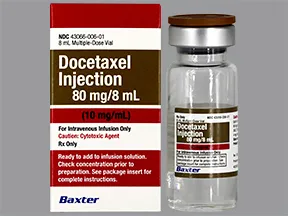 | |
| docetaxel intravenous - | 20 mg/2 mL (10 mg/mL) vial |  | |
| docetaxel intravenous - | 160 mg/16 mL (10 mg/mL) vial |  | |
| docetaxel intravenous - | 160 mg/16 mL (10 mg/mL) vial |  | |
| docetaxel intravenous - | 80 mg/8 mL (10 mg/mL) vial | 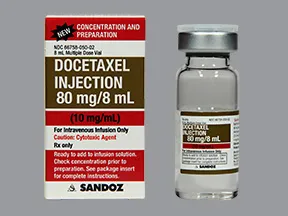 | |
| docetaxel intravenous - | 20 mg/2 mL (10 mg/mL) vial |  | |
| docetaxel intravenous - | 80 mg/8 mL (10 mg/mL) vial |  | |
| docetaxel intravenous - | 160 mg/16 mL (10 mg/mL) vial | 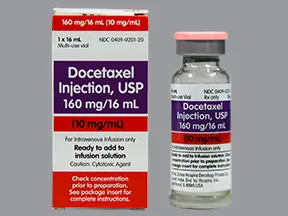 | |
| docetaxel intravenous - | 20 mg/mL (1 mL) vial | 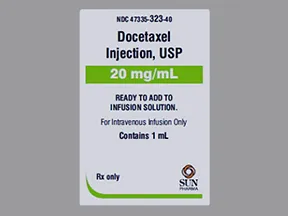 | |
| docetaxel intravenous - | 80 mg/4 mL (20 mg/mL) vial | 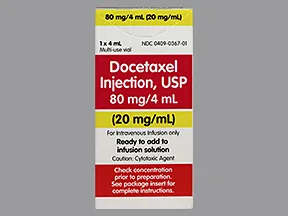 | |
| docetaxel intravenous - | 20 mg/mL (1 mL) vial | 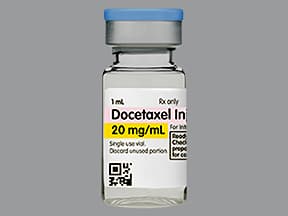 | |
| docetaxel intravenous - | 20 mg/2 mL (10 mg/mL) vial | 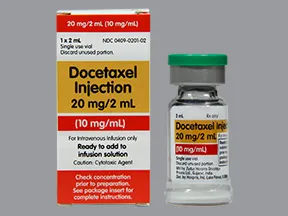 | |
| docetaxel intravenous - | 80 mg/8 mL (10 mg/mL) vial |  | |
| docetaxel intravenous - | 20 mg/mL (1 mL) vial | 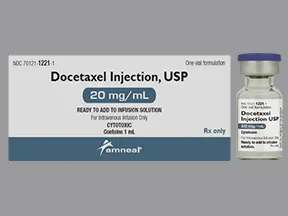 | |
| docetaxel intravenous - | 80 mg/8 mL (10 mg/mL) vial |  | |
| docetaxel intravenous - | 20 mg/2 mL (10 mg/mL) vial |  | |
| docetaxel intravenous - | 160 mg/8 mL (20 mg/mL) vial | 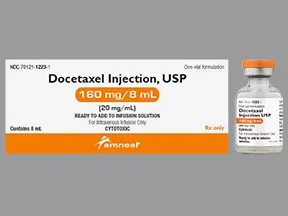 | |
| docetaxel intravenous - | 80 mg/4 mL (20 mg/mL) vial | 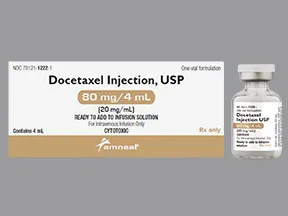 | |
| docetaxel intravenous - | 160 mg/8 mL (20 mg/mL) vial | 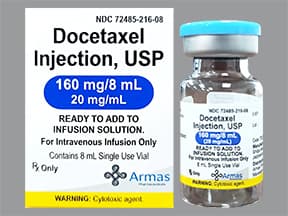 | |
| docetaxel intravenous - | 160 mg/8 mL (20 mg/mL) vial | 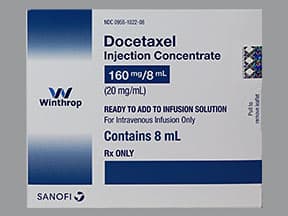 | |
| docetaxel intravenous - | 20 mg/mL (1 mL) vial | 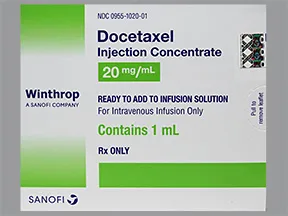 | |
| docetaxel intravenous - | 20 mg/mL (1 mL) vial | 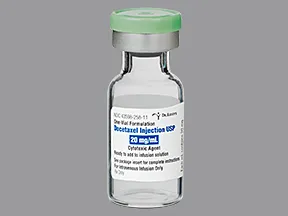 | |
| docetaxel intravenous - | 80 mg/8 mL (10 mg/mL) vial | 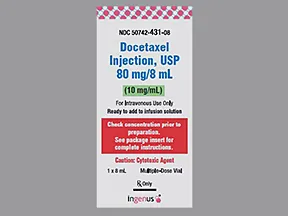 | |
| docetaxel intravenous - | 80 mg/4 mL (20 mg/mL) vial | 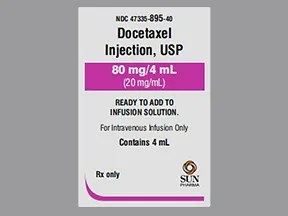 | |
| docetaxel intravenous - | 160 mg/16 mL (10 mg/mL) vial | 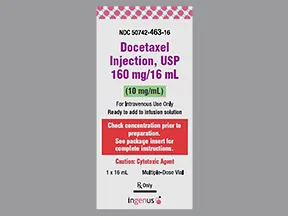 | |
| docetaxel intravenous - | 20 mg/mL (1 mL) vial | 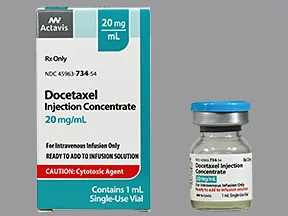 | |
| docetaxel intravenous - | 20 mg/mL (1 mL) vial |  | |
| docetaxel intravenous - | 160 mg/8 mL (20 mg/mL) vial | 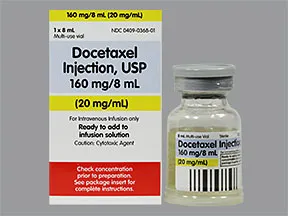 | |
| docetaxel intravenous - | 80 mg/4 mL (20 mg/mL) vial | 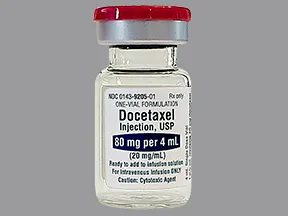 | |
| docetaxel intravenous - | 160 mg/8 mL (20 mg/mL) vial |  | |
| docetaxel intravenous - | 80 mg/4 mL (20 mg/mL) vial | 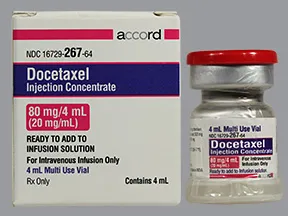 | |
| docetaxel intravenous - | 20 mg/mL (1 mL) vial | 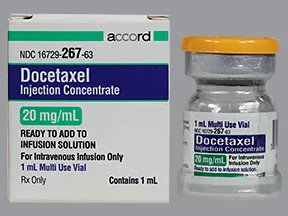 | |
| docetaxel intravenous - | 160 mg/8 mL (20 mg/mL) vial | 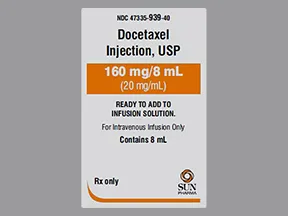 | |
| docetaxel intravenous - | 80 mg/4 mL (20 mg/mL) vial |  | |
| docetaxel intravenous - | 160 mg/16 mL (10 mg/mL) vial |  | |
| docetaxel intravenous - | 20 mg/mL (1 mL) vial | 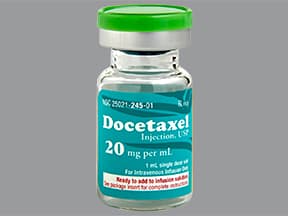 | |
| docetaxel intravenous - | 80 mg/4 mL (20 mg/mL) vial | 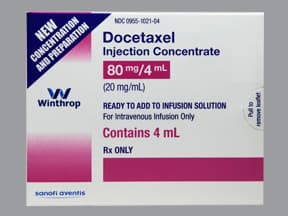 |
Copyright © 2010 First DataBank, Inc.
Patient Handout
docetaxel intravenous
DOCETAXEL - INJECTION
(doh-seh-TAX-ell)
COMMON BRAND NAME(S): Taxotere
WARNING: Docetaxel has caused severe (rarely fatal) allergic reactions and swelling (fluid retention/edema) even with the use of preventive medications. This drug must not be used in patients who have previously had an allergic reaction to it or to other medications containing polysorbate 80.There is an increased risk of serious (possibly fatal) reactions in patients using docetaxel who have liver problems, patients receiving higher doses, and patients with non-small cell lung cancer who have received certain other chemotherapy drugs known as "platinums."Before using this medication, tell your doctor you medical history, especially of liver problems, current/recent infections, and low blood cell counts. Your doctor should monitor your labs (such as liver function, blood counts) closely while you are receiving this medication.
USES: This medication is used to treat cancer (such as breast, lung, prostate, stomach, and head/neck cancer). Docetaxel is a member of a family of drugs called taxanes. This drug works by slowing cell growth.
HOW TO USE: Read the Patient Information Leaflet if available from your pharmacist before you start receiving docetaxel and each time you get a treatment. If you have any questions, ask your doctor, nurse, or pharmacist.This medication is given by injection into a vein by a health care professional. It is given as directed by your doctor, usually over 1 hour every 3 weeks. The dosage and frequency is based on your medical condition, body size, and response to treatment.Your doctor may prescribe pre-medications (such as corticosteroids such as dexamethasone) to prevent side effects like swelling (fluid retention/edema) and allergic reactions. These are generally started 1 day before treatment and continued for a total of 3 days. Carefully follow your doctor's orders to prepare for your treatment. If you forget to take your pre-medication, or do not take it on schedule, tell your doctor or nurse before you receive your docetaxel treatment.
SIDE EFFECTS: See also Warning section.Pain or swelling at the injection site, nausea, vomiting, diarrhea, excessive tearing, tiredness, dizziness, drowsiness, feeling drunk, constipation, and loss of appetite may occur. Nausea and vomiting can be severe. In some cases, your doctor may prescribe medication to prevent or relieve nausea and vomiting. Eating several small meals, not eating before treatment, or limiting activity may help lessen some of these effects. If any of these effects last or get worse, tell your doctor or pharmacist promptly.Temporary hair loss and nail changes may occur. Normal hair growth and nail appearance should return after treatment has ended. However, hair loss may be permanent for some people.People using this medication may have serious side effects. However, you have been prescribed this drug because your doctor has judged that the benefit to you is greater than the risk of side effects. Careful monitoring by your doctor may decrease your risk.Tell your doctor right away if you have any serious side effects, including: unusual tiredness/weakness, swelling ankles/feet/hands, unexplained weight gain, swelling abdomen, easy bruising/bleeding, mouth sores, numbness/tingling of arms/legs, muscle/joint pain, eye pain, irregular heartbeat, stomach/abdominal pain, severe diarrhea, diarrhea with blood or mucus, severe headache.This medication can decrease your body's ability to fight an infection. Tell your doctor right away if you develop any signs of an infection (such as a sore throat that doesn't go away, fever, or chills).Although docetaxel is used to treat cancer, it may rarely increase your risk of getting other cancers (such as acute myeloid leukemia-AML, Non-Hodgkin's Lymphoma, kidney cancer). This may occur months to years after treatment. Your doctor should monitor you closely while you receive this medication and after treatment with this medication.Docetaxel sometimes causes side effects due to the rapid destruction of cancer cells (tumor lysis syndrome). To lower your risk, your doctor may add a medication and tell you to drink plenty of fluids. Tell your doctor right away if you have symptoms such as: low back/side pain (flank pain), signs of kidney problems (such as painful urination, pink/bloody urine, change in the amount of urine), muscle spasms/weakness.Get medical help right away if you have any very serious side effects, including: chest pain, vision changes (such as blurred vision, decreased vision, seeing flashes of light).A very serious allergic reaction to this drug is rare. However, get medical help right away if you notice any symptoms of a serious allergic reaction, including: rash, itching/swelling (especially of the face/tongue/throat), severe dizziness, trouble breathing.This is not a complete list of possible side effects. If you notice other effects not listed above, contact your doctor or pharmacist.In the US -Call your doctor for medical advice about side effects. You may report side effects to FDA at 1-800-FDA-1088 or at www.fda.gov/medwatch.In Canada - Call your doctor for medical advice about side effects. You may report side effects to Health Canada at 1-866-234-2345.
PRECAUTIONS: See also Warning section.Before using docetaxel, tell your doctor or pharmacist if you are allergic to it; or to similar drugs (taxane-type drugs such as paclitaxel, cabazitaxel); or if you have any other allergies. This product may contain inactive ingredients (such as polysorbate 80), which can cause allergic reactions or other problems. Talk to your pharmacist for more details.Before receiving docetaxel, tell your doctor or pharmacist your medical history, especially of: liver problems, lung problems (such as pulmonary effusions), heart problems (such as heart failure), weak immune system (such as neutropenia), blood problems (such as anemia, thrombocytopenia), blood pressure problems.This medication may make you dizzy or drowsy. It also contains alcohol, which can increase these symptoms and also make you feel drunk. Caution is advised if you have liver disease or any other condition that requires you to limit/avoid alcohol. Marijuana (cannabis) can also make you more dizzy or drowsy. Do not drive, use machinery, or do anything that needs alertness for 1 to 2 hours after you receive this medication and until you can do it safely. Limit alcoholic beverages. Talk to your doctor if you are using marijuana (cannabis).Docetaxel can make you more likely to get infections or may make current infections worse. Stay away from anyone who has an infection that may easily spread (such as chickenpox, COVID-19, measles, flu). Talk to your doctor if you have been exposed to an infection or for more details.Tell your health care professional that you are using docetaxel before having any immunizations/vaccinations. Avoid contact with people who have recently received live vaccines (such as flu vaccine inhaled through the nose).To lower the chance of getting cut, bruised, or injured, use caution with sharp objects like razors and nail cutters, and avoid activities such as contact sports.Older adults may be more sensitive to the side effects of this drug, especially anemia, dizziness, diarrhea, infection, swelling, mouth sores, and weight loss.Tell your doctor if you are pregnant or plan to become pregnant. You should not become pregnant while using docetaxel. Docetaxel may harm an unborn baby. Your doctor should order a pregnancy test before you start this medication. Men and women using this medication should ask about reliable forms of birth control during treatment and for some time after the last dose. If you or your partner becomes pregnant, talk to your doctor right away about the risks and benefits of this medication.It is unknown if this drug passes into breast milk. Because of the possible risk to the infant, breastfeeding is not recommended while using this drug and for 1 week after the last dose. Consult your doctor before breastfeeding.
DRUG INTERACTIONS: Drug interactions may change how your medications work or increase your risk for serious side effects. This document does not contain all possible drug interactions. Keep a list of all the products you use (including prescription/nonprescription drugs and herbal products) and share it with your doctor and pharmacist. Do not start, stop, or change the dosage of any medicines without your doctor's approval.Some products that may interact with this drug include: medications that may have a bad reaction with alcohol (such as disulfiram, metronidazole, tinidazole).Other medications can affect the removal of docetaxel from your body, which may affect how docetaxel works. Examples include azole antifungals (such as itraconazole), macrolide antibiotics (such as erythromycin), rifamycins (such as rifabutin), ritonavir, HIV drugs (such as atazanavir), St. John's wort, among others.Tell your doctor or pharmacist if you are taking other products that cause drowsiness such as other alcohol-containing medications or alcoholic beverages, marijuana (cannabis), opioid pain or cough relievers (such as codeine, hydrocodone), drugs for sleep or anxiety (such as alprazolam, lorazepam, zolpidem), muscle relaxants (such as carisoprodol, cyclobenzaprine), or antihistamines (such as cetirizine, diphenhydramine).Check the labels on all your medicines (such as allergy or cough-and-cold products) because they may contain ingredients that cause drowsiness. Ask your pharmacist about using those products safely.
OVERDOSE: If someone has overdosed and has serious symptoms such as passing out or trouble breathing, call 911. Otherwise, call a poison control center right away. US residents can call 1-800-222-1222. Canada residents can call 1-844-764-7669.
NOTES: Lab and/or medical tests (such as blood cell counts, liver function) should be done while you are using this medication. Keep all medical and lab appointments. Consult your doctor for more details.
MISSED DOSE: It is important to get each dose of this medication as scheduled. If you miss a dose, ask your doctor or pharmacist right away for a new dosing schedule.
STORAGE: Not applicable. This medication is given in a clinic and will not be stored at home.
MEDICAL ALERT: Your condition can cause complications in a medical emergency. For information about enrolling in MedicAlert, call 1-888-633-4298 (US) or 1-800-668-1507 (Canada).
Information last revised May 2024. Copyright(c) 2024 First Databank, Inc.
IMPORTANT: HOW TO USE THIS INFORMATION: This is a summary and does NOT have all possible information about this product. This information does not assure that this product is safe, effective, or appropriate for you. This information is not individual medical advice and does not substitute for the advice of your health care professional. Always ask your health care professional for complete information about this product and your specific health needs.
Formulary
Adding plans allows you to compare formulary status to other drugs in the same class.
To view formulary information first create a list of plans. Your list will be saved and can be edited at any time.
Adding plans allows you to:
- View the formulary and any restrictions for each plan.
- Manage and view all your plans together – even plans in different states.
- Compare formulary status to other drugs in the same class.
- Access your plan list on any device – mobile or desktop.






